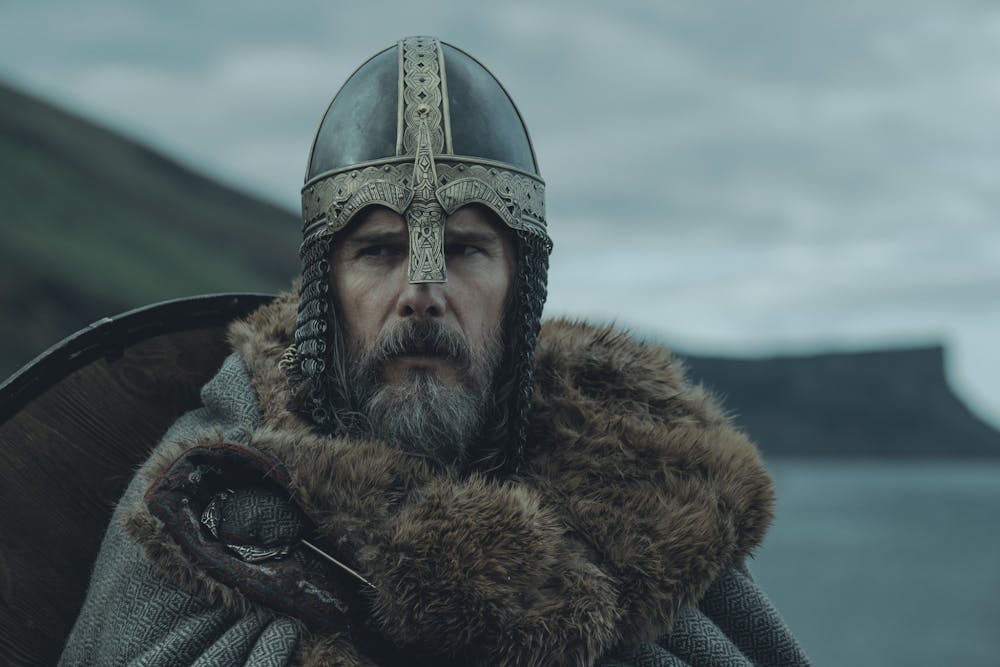Review:‘The Northman’ sees Robert Eggers take his work to a larger stage

Rating: ★★★★½
Robert Eggers is a filmmaker whose work has been defined by its small scale and intensive focus on characters. His prior films, “The Witch” and “The Lighthouse,” both feature a small cast and embrace environmental horror as terrifying events slowly pull the main ensemble apart. His reputation for his smaller scale and focus is partly why “The Northman” was so interesting upon its announcement — “The Northman” blows up Egger’s storytelling onto a massive scale. The locations, number of characters, and time period all dwarf his prior films. For the most part, Eggers steps up to the plate, succeeding in his ambition. “The Northman” will be available to watch in theaters April 22.
“The Northman” is a historical epic that loosely adapts the story of Shakespeare’s “Hamlet,” set among Norse Vikings. While inspired by Shakespeare’s work, the film is far from a beat-for-beat recreation of the play and merely uses the basic plot structure to create an entirely new story.
It follows Alexander Skarsgård as Prince Amleth, the most analogus character to Hamlet in the story, who, as a child, sees his father murdered by his uncle and his mother kidnapped. After barely escaping, we then see a fully grown Amleth who is reminded by a seer, played by Björk, of his oath to avenge his father. This version of Amleth is a very different take on the Hamlet archetype, epitomizing stoicism and a strong sense of duty.
Of course, “The Northman” also features the return of Anya Taylor Joy, who worked with Eggers on “The Witch.” Joy’s character, Olga, embodies a resolve and fighting nature that complements Amleth’s stoicism. Both she and Skarsgård give great performances that showcase a wide range of emotionality and development.
As with his prior films, Eggers poured himself into creating a period-accurate world, or at least one that is as close as possible, world. By working with “Viking historians, archeologists and linguists,” Eggers carefully constructed the film to make sure that the Vikings and their blunt dialect matched historical accounts from that time. While many filmmakers might not delve into this level of detail, Eggers’ dedication to accuracy in the characters’ language and surroundings enhances the film’s atmosphere. The movie also embraces strong symbolism throughout and uses Norse mythology to inform characters’ fighting practices and actions to add further depth to the world.
“The Northman” also sees a newfound necessity for fight choreography, a need that is addressed well with a number of compelling fight scenes that make use of Norse weaponry and diverse backdrops.
Although different from the more intensive, small-scale character studies that Eggers is known for, “The Northman” is still worth the watch and expands his eye for detail to a larger, more spectacular world.
More from The Rice Thresher

Study Abroad Photo Contest spotlights global experiences
For the first time since the Covid-19 pandemic, students gathered in the Ley Student Center to celebrate global experiences through photography.

Review: "The Crux" Should Redefine Djo
Joe Keery’s work has been boiled down to Steve Harrington from “Stranger Things,” but this label shouldn’t define his 10 years in the entertainment industry. Keery, under his stage name “Djo", is the voice behind the TikTok hit “End of Beginning,” which was released with his album “DECIDE” in 2022 and climbed the charts for the first time in 2024. With “The Crux”, Keery’s third album, he tries to separate his work as Djo and an actor, evidenced by the album’s visual of Keery escaping a building.

Review: “Lonely People With Power” merges blackgaze fury with dreamy introspection
Fifteen years into a storied career that’s crisscrossed the boundaries of black metal and shoegaze, Deafheaven has found a way to once again outdo themselves. “Lonely People With Power” feels like a triumphant return to the band’s blackgaze roots, fusing massive walls of guitar-driven sound with whispery dream-pop interludes, recalling their classic album trio of the 2010s (“Sunbather,” “New Bermuda” and “Ordinary Corrupt Human Love”). It also bears the learned refinements of “Infinite Granite,” the 2021 album where they dabbled more boldly in cleaner vocals and atmospheric passages.

Please note All comments are eligible for publication by The Rice Thresher.